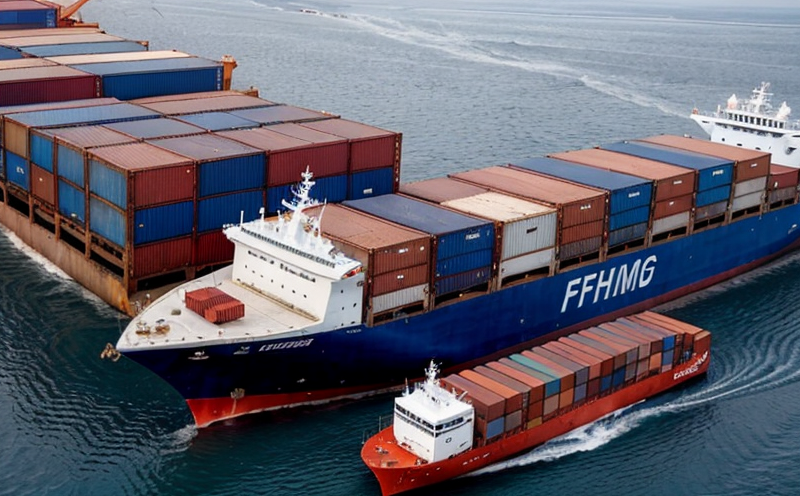
-
Transportation and Logistics Certification-
Certification for Freight and Cargo Transport-
Freight Forwarding and Customs Brokerage Certification
We provide comprehensive solutions designed to help our clients mitigate risks, enhance performance, and excel in key areas such as quality, health & safety, environmental sustainability, and social responsibility.
Discover
For many years, our organization has been operating successfully, boasting modern laboratories that meet international standards. These laboratories are equipped with the latest technology devices and equipment, and we have built a strong team of experienced and trained personnel to operate them.
DiscoverWelcome to Eurolab, your partner in pioneering solutions that encompass every facet of life. We are committed to delivering comprehensive Assurance, Testing, Inspection, and Certification services, empowering our global clientele with the ultimate confidence in their products and processes.
Discover
-
Transportation and Logistics Certification-
Certification for Freight and Cargo Transport-
Freight Forwarding and Customs Brokerage CertificationFreight Forwarding and Customs Brokerage: Understanding the Importance of Certification
The freight forwarding and customs brokerage industry is a complex and highly regulated sector that plays a critical role in facilitating international trade. With the increasing demand for global trade, it has become essential for businesses to navigate the complexities of customs regulations, tariffs, and compliance requirements. In this article, we will delve into the world of freight forwarding and customs brokerage certification, exploring its significance, benefits, and requirements.
Freight Forwarding: An Overview
Freight forwarding is the process of coordinating the transportation of goods from one location to another, often involving multiple modes of transport such as air, land, or sea. Freight forwarders act as intermediaries between shippers and carriers, ensuring that goods are delivered safely and efficiently. They handle tasks such as documentation, customs clearance, and logistics management on behalf of their clients.
Customs Brokerage: A Crucial Component
Customs brokerage is an essential aspect of international trade, involving the clearance of goods through customs at the point of entry into a country. Customs brokers work closely with importers and exporters to ensure compliance with regulations and laws governing imports and exports. They are responsible for filing paperwork, paying duties and taxes, and facilitating the movement of goods across borders.
Certification in Freight Forwarding and Customs Brokerage
To ensure that freight forwarders and customs brokers have the necessary knowledge, skills, and expertise to perform their jobs effectively, certification programs have been established by industry associations and regulatory bodies. These certifications demonstrate an individuals commitment to professionalism, compliance with regulations, and adherence to best practices.
Types of Certification Programs
There are several types of certification programs available in the freight forwarding and customs brokerage industry, including:

Automotive Compliance and Certification
Automotive Compliance and Certification: Ensuring Safety and Efficiency The automotive industry is ...

Military Equipment Standards
Military Equipment Standards: Ensuring Effectiveness and Safety The use of military equipment is a ...

Chemical Safety and Certification
Chemical safety and certification are critical in ensuring the safe management of products and proce...

Product and Retail Standards
Product and Retail Standards: Ensuring Quality and Safety for Consumers In todays competitive marke...

Electromechanical Safety Certification
Electromechanical Safety Certification: Ensuring Compliance and Protecting Lives In todays intercon...

NEBS and Telecommunication Standards
Network Equipment Building System (NEBS) and Telecommunication Standards The Network Equipment Bu...

Environmental Impact Assessment
Environmental Impact Assessment: A Comprehensive Guide Environmental Impact Assessment (EIA) is a c...

Railway Industry Compliance
Railway Industry Compliance: Ensuring Safety and Efficiency The railway industry is a critical comp...

Electrical and Electromagnetic Testing
Electrical and Electromagnetic Testing: A Comprehensive Guide Introduction Electrical and electrom...

Lighting and Optical Device Testing
Lighting and Optical Device Testing: Ensuring Performance and Safety Lighting and optical devices a...

Industrial Equipment Certification
Industrial equipment certification is a critical process that ensures industrial equipment meets spe...

IT and Data Center Certification
IT and Data Center Certification: Understanding the Importance and Benefits The field of Informatio...

Hospitality and Tourism Certification
Hospitality and Tourism Certification: Unlocking Opportunities in the Industry The hospitality and ...

Food Safety and Testing
Food Safety and Testing: Ensuring the Quality of Our Food As consumers, we expect our food to be sa...

Pharmaceutical Compliance
Pharmaceutical compliance refers to the adherence of pharmaceutical companies and organizations to l...

Healthcare and Medical Devices
The Evolution of Healthcare and Medical Devices: Trends, Innovations, and Challenges The healthcare...

Transportation and Logistics Certification
Transportation and Logistics Certification: A Comprehensive Guide The transportation and logistics ...

Aviation and Aerospace Testing
Aviation and Aerospace Testing: Ensuring Safety and Efficiency The aviation and aerospace industr...

MDR Testing and Compliance
MDR Testing and Compliance: A Comprehensive Guide The Medical Device Regulation (MDR) is a comprehe...

Environmental Simulation Testing
Environmental Simulation Testing: A Comprehensive Guide In todays world, where technology is rapidl...

Cosmetic Product Testing
The Complex World of Cosmetic Product Testing The cosmetics industry is a multi-billion-dollar ma...

Construction and Engineering Compliance
Construction and Engineering Compliance: Ensuring Safety, Quality, and Regulatory Adherence In the ...

Consumer Product Safety
Consumer Product Safety: Protecting Consumers from Harmful Products As a consumer, you have the rig...

Energy and Sustainability Standards
In today’s rapidly evolving world, businesses face increasing pressure to meet global energy a...

Battery Testing and Safety
Battery Testing and Safety: A Comprehensive Guide As technology continues to advance, battery-power...

Fire Safety and Prevention Standards
Fire Safety and Prevention Standards: Protecting Lives and Property Fire safety and prevention stan...

Pressure Vessels and Installations Testing
Pressure Vessels and Installations Testing Pressure vessels are a critical component of various ind...

Agricultural Equipment Certification
Agricultural equipment certification is a process that ensures agricultural machinery meets specific...

Renewable Energy Testing and Standards
Renewable Energy Testing and Standards: Ensuring a Sustainable Future The world is rapidly transiti...

Trade and Government Regulations
Trade and government regulations play a vital role in shaping the global economy. These regulations ...